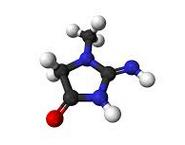In order to know the meaning of the term creatinine, it is necessary, first of all, to know its etymological origin. In this case, we can state that it is a word that derives from Latin, exactly the result of the sum of the noun “cratina” and the suffix “-ina”, which is synonymous with “substance”. Cratina, in turn, comes from the Greek “kreas”, which can be translated as “meat”.
Creatinine is a substance generated by muscle metabolism . This organic molecule is filtered by the kidneys and discarded through urine: therefore, a high level of creatinine in the blood reveals a kidney disorder, while a reduced level is usually associated with malnutrition.
 Muscle metabolism uses creatine as a nutrient . Said organic acid, when degraded, gives rise to creatinine, which must be excreted from the body. The measurement of creatinine, in this framework, is one of the most frequent diagnostic methods to analyze the functioning of the kidneys.
Muscle metabolism uses creatine as a nutrient . Said organic acid, when degraded, gives rise to creatinine, which must be excreted from the body. The measurement of creatinine, in this framework, is one of the most frequent diagnostic methods to analyze the functioning of the kidneys.
It is common for a creatine clearance test to be performed. For this study, urine and a blood sample are collected, and both amounts of creatinine are then compared using a formula that allows clearance to be calculated. The result provides useful information about kidney function and the degree of kidney failure.
The level of creatinine in the blood depends on the sex, age and weight of the person. This means that there is no single adequate level in human beings, but rather the values that are considered normal change according to the aforementioned variables.
As a reference, it can be indicated that the normal creatinine level in an adult woman is between 0.6 and 1.1 mg/dL , while in a man it is between 0.7 and 1.3 mg/DL . In general, women have a lower level than men since they usually have less muscle mass. The values that are considered normal, however, may vary depending on the laboratory.
Precisely because it is associated with muscle mass, we have to be clear that a person who practices sports can have higher levels of creatinine than someone who does not exercise. Not to mention that these levels may be higher due to the intake of certain foods.
Beyond these references, it is necessary for a doctor to analyze the results of a blood creatinine measurement study to determine whether they are normal or not.
It is interesting to know that there are a series of symptoms or signs that make it clear that a person may have problems with creatinine. Specifically, among the most significant are the following:
-He suffers from nausea and even vomits.
-He has lost his appetite.
-Decrease weight clearly.
-Both his feet and hands look swollen.
-You notice that your urine has changed in color and even the smell of it has changed as well.
-Feel frequent headaches.
-You feel more fatigued.
When you have high levels of creatinine in your blood, the doctor will establish the necessary guidelines to reduce them, which may include increasing your intake of fruits, vegetables and greens, as well as drinking at least 2 liters of water daily.
